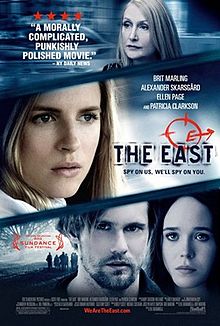 |
| Copyright: Fox Searchlight Pictures |
Dumpster diving, train hopping, first
aid that relies on superglue and home-made anesthetics. These are just some of
the characteristic of the daily life of an imaginary group of underground
activist called The East that live off the grid. One day Sarah, a young woman
crosses their path by accident. Few days before that, Sarah left her
boyfriend and took a fake trip to Dubai,
but instead went undercover as an agent for a private security firm. Her mission
is to evaluate the group and figure out what exactly are they capable of, after
an an incursion that left the insides of a mansion belonging to an oil company
CEO covered in his product.
The East was distributed by Fox
Searchlight, but is mostly the brain child of Brit Marling. Marlin is
definitely an emerging writing voice in Hollywood, which can be seen by the
cast she got for her new movie – directed by Zal Batmanglij, as her previous
movie, but starring alongside herself, Ellen Page, Patricia Clarkson and
Alexander Skarsgård. Mainstream is definitely taking notice of her talent, and
the bigger budget she got wasn’t wasted on cheap tricks.
The dynamic is clearly a political
thriller, but the way the movie avoids violence, and the regular motions we see
in these kinds of films. By placing the main character in the shoes of an
undercover agent, the back and forth transition between the freegans of The
East and the security firm doesn’t become bothersome, and the two sides of the
story smoothly interlock in Sarah’s eyes.
Brit Marling, who also stars in the
lead role, is obviously fascinated by the idea of a renegade group that
gradually draws in the person that is firstly intended on its destruction. But
the resemblance to her last film, The Sound of My Voice, ends there. Instead of
an open ending, The East resolves its issues, seen from the eyes of the main
character, much earlier – the moment when Sarah Moss decides to jump into the
rabbit hole isn’t important. Instead, the movie explores the way she chooses to
do it. Persons from the corporate world that The East target aren’t simply
“enemies”, but are also complex individuals that make both wrong and right
decisions, so that we as an audience can’t easily demonize them as the shallow,
greedy villains, no matter how hard the group try’s to portray them this way to
each other. Simultaneously, the environment is degrade and polluted day by day,
and other men, women and children continue to suffer because of them.
Through Sarah’s dilemma, the story
also cleverly analyses the idea of changing an undoubtedly unjust world,
without sooner or later coming to a conclusion that explosives and guns are
needed for this noble task.
Environmentalism, responsibility, and
belief in humanity are all woven by Marling, and the ending provides a clean
knot that rounds up the whole story. I’m eagerly looking forward to her next
movie, and the subject she decides to present through it.